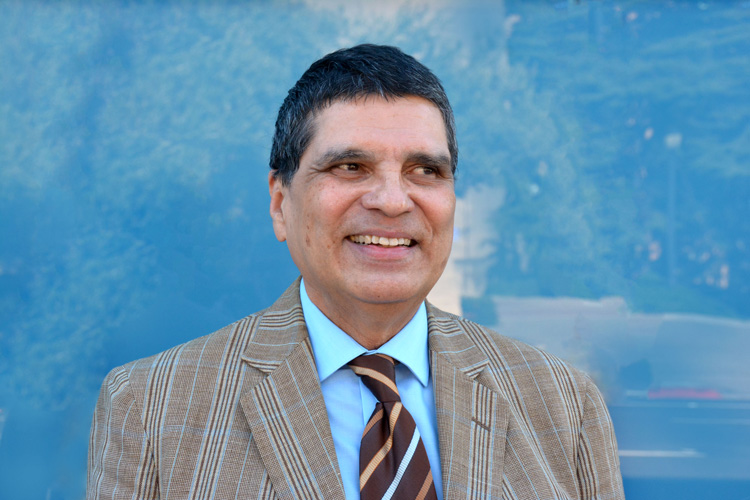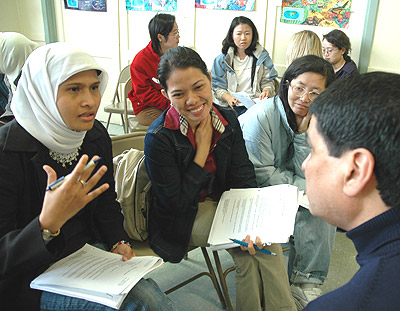Sam Castañeda: Making postdocs feel at home
Founder and director of the 25-year-old Visiting Scholar and Postdoc Affairs office, now a model for the UC system, was honored with a national award for his role
February 28, 2018
Each year, some 1,500 postdoctoral fellows come to UC Berkeley from around the world, often with spouses and kids in tow, to be confronted by a shockingly high cost of living, a shortage of housing, a strange culture and language and, above all, the pressure to produce groundbreaking research.

Sam Castañeda, founder and director of the Visiting Scholar and Postdoc Affairs office. (UC Berkeley photo by Hulda Nelson)
Luckily, Sam Castañeda has their back. He’s an ambassador, fixer, troubleshooter, career counselor, social director and all around mother hen for fellows and their families.
Castañeda is director of the Visiting Scholar and Postdoc Affairs office, which he founded 25 years ago, one of the first postdoc support programs in the nation and a model for the UC system. From the get-go, he focused on gaining postdocs the same health and welfare benefits as staff and faculty, creating a system that is held up as a national model and is slowly being replicated at other universities.
That system makes UC Berkeley a major draw for postdocs and other visiting scholars and students, nationally and internationally.
“The Visiting Scholar and Postdoc Affairs program provides critical support to the postdoc community, and all of us at Berkeley are thankful for the extraordinary work they do,” said Randy Katz, UC Berkeley vice chancellor for research and a professor of electrical engineering and computer sciences. “It helps make our campus one of the most intellectually exciting places in the world for discovery and learning.”

Students living at University Village and taking a course called America 101 compare notes on culture shock with Castañeda (front) in 2008. (UC Berkeley photo by Cathy Cockrell)
Castañeda’s efforts have now earned him the 2018 Distinguished Service Award from the National Postdoctoral Association. Of the individuals so honored since 2004 for demonstrating “a profound, sustained, or leadership contribution to improving the postdoctoral experience,” he’s the only recipient without a Ph.D.
Castañeda helped the UC system to adopt the UC Berkeley model – essentially treating postdocs equitably, whether they’re hired as employees or come with their own funds – and has initiated numerous other programs to make the lives of the campus’s postdocs and their significant others as pain-free as possible.
“Postdocs are a vital part of our research community,” Katz said. “They come to Berkeley to grow as researchers, and under the mentorship of our faculty, take a more active role as initiators and leaders of our research activities. They greatly enrich our intellectual ecosystem, through their initiative and the relationships they form with faculty, students and staff.”
“They’re young, they’re vibrant, they’re interesting, they’re international, they’re friendly — and they’re so needy,” Castañeda said, explaining what he loves about the job, but also the frustrations that postdocs encounter. “This isn’t their country, it’s not their culture, they have a million things that they need help with. We’ve created a support system.”
Postdocs were once an invisible population
When former dean of the Graduate Division Joseph Cerny asked him to provide help for postdocs in 1993, Castaneda wasn’t even sure what a postdoc was. In some sense, the university wasn’t quite sure, either, and struggled with how to treat this “invisible population.”

2017 participants in a customized multicultural course called Designing Your Life in the United States, offered free three times a year to spouses and partners of postdocs, visiting scholars and visiting student researchers.
All come to UC Berkeley to conduct research with the best academic researchers in the world; it’s like a feather in their caps. But many come fully supported by their country of origin, which meant originally that the university couldn’t treat them as employees, so they lacked healthcare and other employee amenities.
Thanks to Castañeda, that changed in 2000, and subsequently he lobbied the university to provide similar health and welfare benefits to postdocs and their dependents across the UC system. Over the years, he has created customized symposia, workshops and networking events to support and connect the campus’s postdocs as well as its 1,500 visiting scholars and 1,200 visiting student researchers – graduate students finishing their theses – each year. These resources help to broaden their career and professional development opportunities, he said.
Other programs address stress reduction, mentorship, language and communication, networking, personal development and conflict resolution. He is particularly proud of the Berkeley Spouses, Partners and Parents Association, which provides a largely international community of spouse or partner professionals with access to career counseling, language and communication courses, psychological intervention, cultural adjustment and networking.
One person who nominated Castañeda for the NPA award noted that he “has created innovative sessions that assist them in navigating and understanding American life while retaining their unique cultural identity.”
“Strange food, culture, language, visa issues, transport, health care, the list just goes on and on. And not having family and friends, not having a social support system, while your spouse is working 80 hours per week, it’s easy to see how anyone could struggle initially,” Castañeda said in 2011, explaining the rationale behind such classes.
Teaching smart skills, including managing your faculty member
For the postdocs themselves, who now have a union to advocate for them, Castañeda’s office provides critical advice.

Audience at a start-up job fair in April 2017, organized by the Postdoc Industry Exploration Program and supported by the Visiting Scholars and Postdoc Affairs office.
“We teach smart skills, stuff you don’t get in your Ph.D. program. Such as how to manage your faculty member, which means making certain that that person embraces your career,” he said.
Nationally, Castañeda was a founding member of the National Postdoc Association, and is the founder and current chair of the Postdoc Special Interest Group of NAFSA: Association of International Educators, a group originally called the National Association of Foreign Student Advisers.
Born and raised in Los Angeles, Castañeda was the son of Mexican immigrants, though he had to move to Mexico City to learn Spanish. His father was a tire builder for BFGoodrich, and as a child, Castañeda frequently joined him on the picket line.
About 35 years ago, he took a job at UCLA, and in 1988 moved to Berkeley, where he started out as a administrative assistant in the Graduate Division. Around that time, postdocs began organizing for better working conditions, and Castañeda became involved in surveys of postdoc concerns, contributing to a broad study conducted by the National Academy of Sciences. Out of that came the NPA, and Castañeda’s has helped push the bar higher ever since.
Now 68, he has one more goal before retirement: to find donors to help build housing on or near the UC Berkeley campus for both single postdocs and those with accompanying families. And to serve one more invisible population: pets. Currently, no university housing allows pets.
“When these families have a pet … you know, they can’t leave their dog back home, that’s like their kid, or that’s their kids pet,” he said,
He only hopes that when they build postdoc housing, they include on the ground floor a café: “Sam’s Café.”